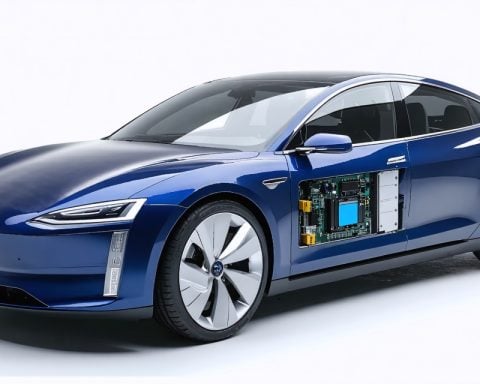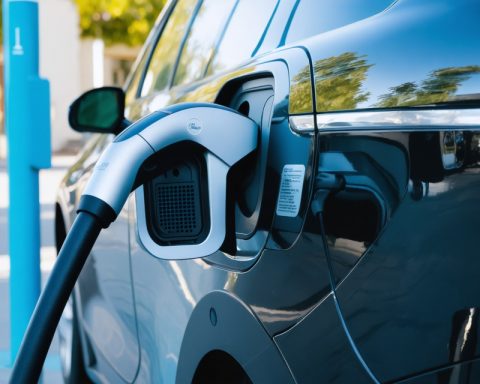Decarbonisation Revealed: Businesses Embrace Electric Fleets
Recent findings from a survey of over 250 fleet managers with large vehicle operations show a promising shift towards electric vehicles (EVs). A significant 47% of participants indicated that adopting EVs has led to positive changes in their businesses.
This research, carried out by mobility provider Ayvens, highlighted that government regulations and climate concerns are major catalysts for this transition, with 44% of decision-makers citing these factors as key motivators for fleet decarbonisation. The transition to electric power seems to encourage additional investments, with 46% of companies planning to invest in renewable energy and 48% focusing on enhancing driver training and optimizing routes.
The benefits extend beyond environmental impacts; many report reduced operational costs (49%), boosted employee engagement, and a better company reputation, both at 56%.
Tim Laver, the UK Managing Director at Ayvens, elaborated on the insights gathered, emphasizing that fleets see this transition as part of a broader strategy. However, he acknowledged the obstacles tied to adapting new technologies, facing supply chain setbacks, and the ambiguity surrounding government policies. Notably, 51% cited technology challenges, while 43% pointed to an inadequate charging network.
The urgency for clearer guidelines from regulatory bodies is evident, as 35% of respondents indicated that their decarbonisation efforts have slowed due to fluctuating policies. The call for action is clear: enhanced clarity is essential for the sustainable future of fleet operations.
Implications of Electric Fleet Adoption
The shift towards electric vehicle (EV) fleets represents a pivotal moment for businesses, but its implications extend significantly into society, culture, and the global economy. As corporate fleet managers increasingly opt for EVs, they are not just participating in a trend; they are influencing broader cultural attitudes toward sustainability. This transition aligns with rising public concern for climate change and environmental responsibility, marking a cultural shift where eco-consciousness becomes integral to business identity.
The global economy stands to benefit from this transition as well. Major investments in EV infrastructure, such as charging stations, are expected to stimulate economic opportunities, especially in technology and renewable energy sectors. The shift may create up to 1.5 million jobs in the U.S. alone by 2030, as noted by various research organizations. Additionally, this adoption can contribute to lowering fossil fuel dependence, potentially stabilizing energy prices amid geopolitical tensions.
However, environmental effects cannot be overlooked. As the demand for EVs increases, so do concerns about battery production and resource extraction. The push for sustainable batteries may lead to innovations that mitigate these effects, such as recycling initiatives or new battery technologies that reduce environmental degradation.
Looking to the future, as businesses continue embracing decarbonisation, a more integrated approach toward sustainability will likely emerge. The understanding that corporate responsibility includes tackling climate change could position companies as leaders in the enactment of sustainable policies. This aligns with the global movement toward climate action, demonstrating that the transition to electric fleets is not merely an operational change, but a necessary evolution in the pursuit of a sustainable economy.
The Electric Revolution: Why Businesses Are Transitioning to Green Fleets
Decarbonisation Revealed: Businesses Embrace Electric Fleets
The transportation sector is undergoing a significant transformation as businesses increasingly pivot towards electric vehicle (EV) fleets. Insights from a recent survey conducted by mobility provider Ayvens, which encompassed over 250 fleet managers, reveal a robust enthusiasm for EV adoption among large vehicle operations. Notably, 47% of participants reported that integrating EVs has led to notable improvements in their business operations.
Driving Forces Behind the Shift
The transition to electric fleets is driven by several critical factors. Government regulations and climate change concerns emerged as dominant motivators, with 44% of decision-makers highlighting these reasons as key drivers for their organizations’ decarbonisation strategies. In addition, this shift is prompting companies to allocate resources towards sustainability, with 46% planning investments in renewable energy, and 48% aiming to enhance driver training and optimize their logistics routes.
Advantages of Electric Fleets
The benefits of transitioning to electric vehicles extend beyond just environmental impacts. According to the survey, businesses have reported reduced operational costs for nearly half of the respondents (49%), alongside increased employee engagement and an enhanced corporate reputation, cited by 56% of participants. This multifaceted approach not only aligns with corporate social responsibility goals but also contributes to bottom-line savings and positive branding.
Challenges on the Road to Decarbonisation
While the advantages are clear, the transition is not without its challenges. Tim Laver, UK Managing Director at Ayvens, emphasized the hurdles associated with adopting new technologies, including supply chain issues and uncertainties surrounding government policies. The study revealed that 51% of fleet managers faced significant technology-related challenges, while 43% identified the lack of a sufficient charging network as a major barrier to further implementation.
The Need for Policy Clarity
The findings underscore an urgent demand for clearer regulatory guidelines, as 35% of respondents indicated that their decarbonisation initiatives have hit a snag due to inconsistent government policies. Fleet managers are advocating for enhanced clarity to help navigate the complexities of transitioning to electric fleets effectively.
Future Trends and Insights
As the market evolves, several trends are shaping the future of electric fleets:
– Technological Innovations: Advances in battery technology and charging infrastructure are expected to ease some of the challenges currently faced by fleet operators, making EVs more feasible and accessible.
– Sustainability Focus: As companies increasingly prioritize sustainability, integrating EVs within fleet operations will likely become a best practice rather than an exception.
– Increased Collaboration: Partnerships between vehicle manufacturers, energy providers, and technology companies will play a crucial role in addressing the operational challenges of EV integration.
Conclusion
The shift towards electric vehicles represents not only a commitment to reducing carbon footprints but also an opportunity for operational improvements and cost savings. As businesses navigate this transition, the need for supportive policies and technology solutions remains paramount for the sustainable advancement of fleet operations.
For more insights on sustainability and fleet management, visit Ayvens.













